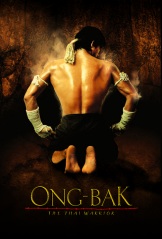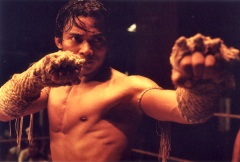| Ong-Bak: The Thai Warrior |
| |
 |
Thai language. Thailand, 2004. Rated PG-13.
105 minutes.
Cast:
Tony Jaa, Petchthai Wongkamlao, Pumwaree Yodkamol, Rungrawee Borrijindakul, Chetwut Wacharakun, Wannakit Siriput, Sukhaaw Phongwilai, Chatthapong Pantanaunkul, Pornpimol Chookanthong, Chumporn Teppitak
Writer: Suphachai Sithiampha
Original Music: Atomix Clubbing
Cinematography: Natawut Kittikun
Fight/Stunt Choreography: Phanna Rithikrai
Producers: Prachya Pinkaew, Sukanya Vongsthapat
Director: Prachya Pinkaew
LINKS
|
[Read the AboutFilm interview with Tony Jaa]
 ravity-defying kung fu. Fights enhanced by digitally erased wires and harnesses. The craze began, at least for U.S. audiences, with The Matrix , and then grew with Crouching Tiger, Hidden Dragon. Now even Jet Li, who once disavowed them, agreed to use wires in Hero. But after Hero and The House of Flying Daggers, can martial arts in the movies surprise anyone anymore?
ravity-defying kung fu. Fights enhanced by digitally erased wires and harnesses. The craze began, at least for U.S. audiences, with The Matrix , and then grew with Crouching Tiger, Hidden Dragon. Now even Jet Li, who once disavowed them, agreed to use wires in Hero. But after Hero and The House of Flying Daggers, can martial arts in the movies surprise anyone anymore?
The answer is yes.
We can be surprised—not by the lack of gravity, but by the undeniable presence of it, and by what one man does in spite of it.
Meet Thailand 's Tony Jaa, an expert in the ancient discipline of Muay Thai and the last remaining protégé of Thai action star Phanna Rithikrai (Born to Fight). Jaa uses no wires, and as incredible as it may seem after watching Ong-Bak, director Prachya Pinkaew steadfastly maintains that no computer effects or camera tricks were used to enhance what you see on screen. When Jaa's pants catch fire during a fight scene at a deserted gas station, they really do catch fire.

Tony Jaa faces an opponent in Ong-Bak: The Thai Warrior. |
Jaa may not be able to suddenly take off into flight, stand on leaves, or run on water, but his leaping ability is more incredible than the stunts in other films because it is unquestionably for real. Jaa is as much an acrobat as a fighter, literally leaping over cars in single bound, sliding under one vehicle on the run in a single move, and even crowd walking. Jaa's stunts are not showy, though. Every move he makes is economical, contained, and precise—necessarily so, to do this stuff for real. You can't waste movement; you can't expend energy unnecessarily. Jaa is always aware of his center of balance, never overreaches, and never moves until exactly the right time to move.
Ong-Bak is less a film than a medium to introduce Jaa to the world. It starts off in a small Thai village that time forgot during a major festival. The tranquility is broken when someone makes off with the head of the town's Ong Bak (Buddha statue). This is very, very bad. Shouldering the hopes of the whole town, Ting (Jaa) volunteers to recover the head and heads to Bangkok . There, he seeks out a former villager named George (popular Thai comedian Petchthai Wongkamlao), who—well, it doesn't matter, really. You've got your prizefights. You've got your sneering villains in sunglasses, and even a gang boss who holds an electronic modulator against his voicebox to speak. And you've got your Asian-movie melodramatics—predictably corny character arcs, people vowing to accomplish certain tasks even if it costs them their lives, that sort of thing.
The acting is terrible; the story is terrible; let's face it, the whole movie is terrible despite a few stylish flourishes that occasionally work. But the moves, the fighting, are so not terrible. I have never before been to a screening where a film had a group of jaded film critics yelling and woo-hooing, but Ong-Bak accomplished just that, without much of a budget, either. Who needs a budget when you can do what Tony Jaa can do?
Review
© December 2004 by AboutFilm.Com and the author.
Images © 2004 Magnolia Pictures. All Rights Reserved.


